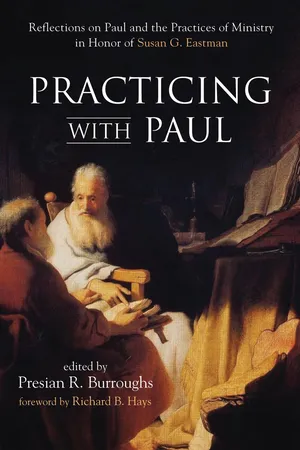![]()
1
Participation and Ministerial Integrity in the Letters of Paul
Michael J. Gorman
For we cannot do anything against the truth, but only for the truth.
—2 Corinthians 13:8
It is a distinct pleasure to contribute to this volume honoring my friend and colleague Susan Eastman. Susan’s appointment at Duke to teach in the ministerial division as well as the biblical division has always appealed to me, as I have also tried to bridge that divide in my own teaching and writing. Of great significance to each of us has been the theme of “participation” in Paul, and I wish to take up that theme in this essay. What does it mean for a minister of the gospel to live “in Christ” with integrity?
The Need for Ministerial Integrity
Offering such a heading for this initial section may sound something like proposing an article for a medical journal with the title, “The Need for Physician Competence”: it is an exercise in stating the obvious. But the obvious is not always so obvious—or practiced. As I was preparing this essay, I received word of reported widespread domestic abuse among clergy in Australia. Closer to home, I have taught (as a Protestant) in a Roman Catholic seminary for more than a quarter-century, which means I—and my colleagues and students, not to mention their families, friends, peers, and bishops—have lived through intense periods of hurt, scandal, repentance, change, and so on.
The issue of integrity—consistency between professed belief and actual practice—is not new to the Christian community. In fact, it is a major concern in the Pauline letters, and it cuts both ways. On the one hand, some of Paul’s critics say, “His letters are weighty and strong, but his bodily presence is weak, and his speech contemptible” (2 Cor 10:10). Paul is also disparaged for not accepting the Corinthians’ financial support but, instead, supporting himself with manual labor (2 Cor 11:7–11) while perhaps stealing from the collection for Jerusalem (2 Cor 12:14–18). Therefore, as we will see, Paul often feels the need to defend the integrity of his ministry.
On the other hand, Paul was not one to mince words when it came to the question of others’ integrity, of their not living and ministering in ways that are “worthy of the gospel of Christ” (Phil 1:27; see also Gal 2:14):
1. In Gal 2:4 Paul speaks of what happened during a meeting with Jerusalem leaders, when “false believers [were] secretly brought in, who slipped in to spy on the freedom we have in Christ Jesus, so that they might enslave us [meaning at least Paul and the uncircumcised gentile Titus].”
2. Only a few verses later, in Gal 2:11–14, Paul tells the Galatians how he excoriated Cephas (Peter) and Barnabas for their hypocrisy, for “not acting consistently with the truth of the gospel” (2:14), after they had withdrawn from table fellowship with gentiles. Paul says he “opposed him [Cephas] to his face, because he [Cephas] stood self-condemned” (2:11).
3. In 1 Corinthians, Paul finds serious fault with a whole range of people, at least some of whom are “ministers” or leaders: those responsible for fracturing the community (1:10—4:21); those exercising alleged personal rights to the detriment of fellow Christians and to themselves (6:1–11; 8:1—11:1); those engaging in inappropriate sexual relationships (5:1–11; 6:12–20); those turning the Lord’s supper into a pagan banquet for the elite (11:17–34); and those with esteemed spiritual gifts feeling superior and making others feel inferior (chapters 12–14).
4. In 2 Corinthians, Paul has sharp words for those he sarcastically calls “super-apostles” (11:5; 12:11) for arrogantly offering what he considers to be a false Jesus, Spirit, and gospel (11:4). He calls them “boasters [who] are false apostles, deceitful workers, disguising themselves as apostles of Christ,” just as “Satan disguises himself as an angel of light” (11:13–14).
What is it that these various behaviors represent for Paul? They are failures of integrity. While there are certainly various dimensions of the problem, the fundamental issue is that the behaviors are inconsistent with the gospel narrative, the story of Christ. And for Paul, that story is narrated clearly, with wide-ranging implications for all who claim to believe it, in Philippians.
The Starting Point: Christ’s Participation with Us
As Susan Eastman has frequently pointed out, our participation in Christ, in his story, is dependent on and derives from Christ’s initial participation with us, in our human story. Here is how Paul narrates Christ’s participation with us in the second chapter of his letter to the Philippians (the translation is mine):
We should note four things about this text.
First, it is clearly a story of Christ’s participation with us, a drama with two main events: his incarnation and his death on the cross. The incarnation (indicated by [z1] above) is presented as Christ’s self-emptying (kenosis) and self-enslavement, or total self-giving. Christ’s death (indicated by [z2] above) is similarly presented as his complete self-humbling and obedience (to the Father), even to the point of accepting the cruelest form of death known in antiquity: crucifixion, reserved for slaves and other despicables. This, then, is not a résumé of advancement but of downward mobility: the counterintuitive, countercultural narrative of a strange way of be...
